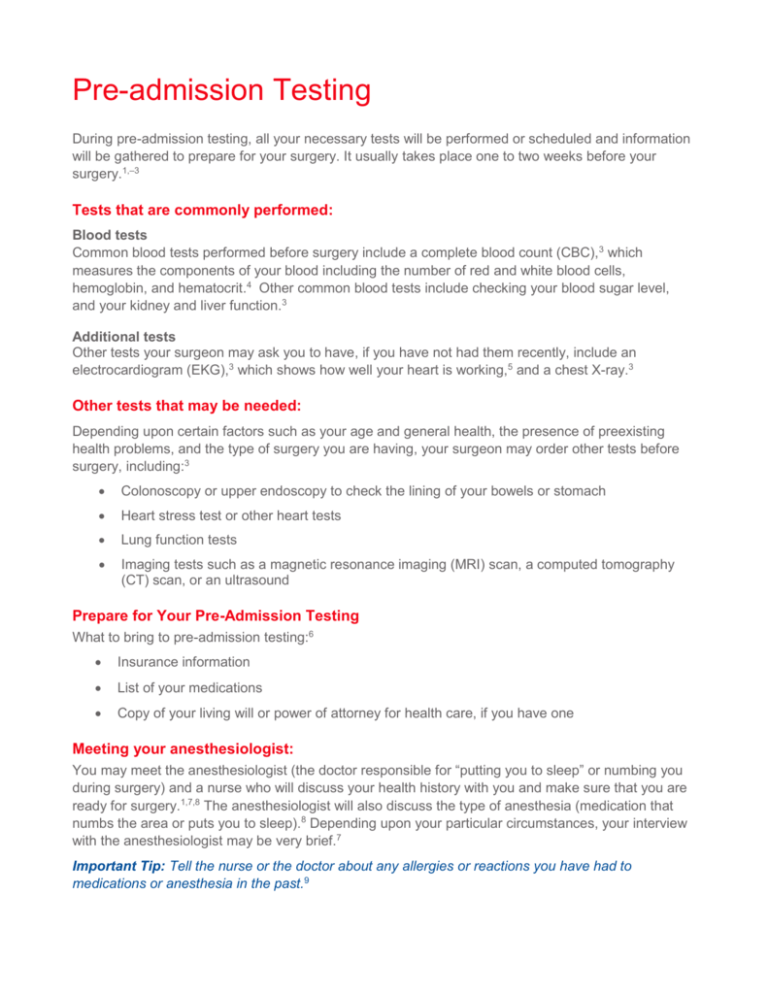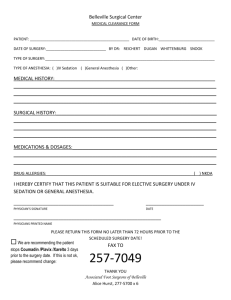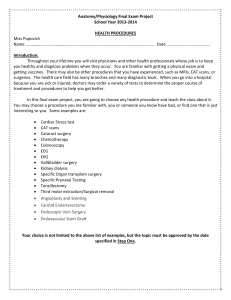Pre-Admission Testing - SCG Internal Roadmap
advertisement

Pre-admission Testing During pre-admission testing, all your necessary tests will be performed or scheduled and information will be gathered to prepare for your surgery. It usually takes place one to two weeks before your surgery.1,–3 Tests that are commonly performed: Blood tests Common blood tests performed before surgery include a complete blood count (CBC),3 which measures the components of your blood including the number of red and white blood cells, hemoglobin, and hematocrit.4 Other common blood tests include checking your blood sugar level, and your kidney and liver function.3 Additional tests Other tests your surgeon may ask you to have, if you have not had them recently, include an electrocardiogram (EKG),3 which shows how well your heart is working,5 and a chest X-ray.3 Other tests that may be needed: Depending upon certain factors such as your age and general health, the presence of preexisting health problems, and the type of surgery you are having, your surgeon may order other tests before surgery, including:3 Colonoscopy or upper endoscopy to check the lining of your bowels or stomach Heart stress test or other heart tests Lung function tests Imaging tests such as a magnetic resonance imaging (MRI) scan, a computed tomography (CT) scan, or an ultrasound Prepare for Your Pre-Admission Testing What to bring to pre-admission testing:6 Insurance information List of your medications Copy of your living will or power of attorney for health care, if you have one Meeting your anesthesiologist: You may meet the anesthesiologist (the doctor responsible for “putting you to sleep” or numbing you during surgery) and a nurse who will discuss your health history with you and make sure that you are ready for surgery.1,7,8 The anesthesiologist will also discuss the type of anesthesia (medication that numbs the area or puts you to sleep).8 Depending upon your particular circumstances, your interview with the anesthesiologist may be very brief.7 Important Tip: Tell the nurse or the doctor about any allergies or reactions you have had to medications or anesthesia in the past.9 Instructions for the day of surgery The nurse will give you instructions for your surgery, such as which medications to take the day of surgery and not to eat or drink anything after midnight, the night before the surgery. 8 References 1. The Knee Society. Total knee replacement. Preparing for surgery. http://www.kneesociety.org/web/patienteducation_totalknee.html. Accessed September 22, 2014. 2. Zambouri A. Preoperative evaluation and preparation for anesthesia and surgery. Hippokratia. 2007;11(1):13–21. 3. MedlinePlus. Tests and visits before surgery. http://www.nlm.nih.gov/medlineplus/ency/patientinstructions/000479.htm. Accessed September 22, 2014. 4. MedlinePlus. CBC. http://www.nlm.nih.gov/medlineplus/ency/article/003642.htm. Accessed September 22, 2014. 5. National Institutes of Health. National Heart, Lung, and Blood Institute. What is an electrocardiogram? http://www.nhlbi.nih.gov/health/health-topics/topics/ekg/#. Accessed September 22, 2014. 6. National Institute on Aging. National Institutes of Health. AgePage. Hospital hints. http://www.nia.nih.gov/sites/default/files/hospital_hints_0.pdf. Accessed September 22, 2014. 7. American Society of Anesthesiologists. The role of the anesthesiologist. http://www.lifelinetomodernmedicine.com/Who-Is-An-Anesthesiologist/The-Role-of-theAnesthesiologist.aspx. Accessed September 22, 2014. 8. DeLamar LM. Preparing your patient for surgery. Topics Adv Pract Nurse Journal. 2005;5(1). http://www.medscape.com/viewarticle/500887_5. Accessed August 19, 2014. 9. MedlinePlus. General anesthesia. http://www.nlm.nih.gov/medlineplus/ency/article/007410.htm. Accessed September 22, 2014. © Johnson & Johnson Health Care Systems Inc. 2014 October 2014 017816-140701







